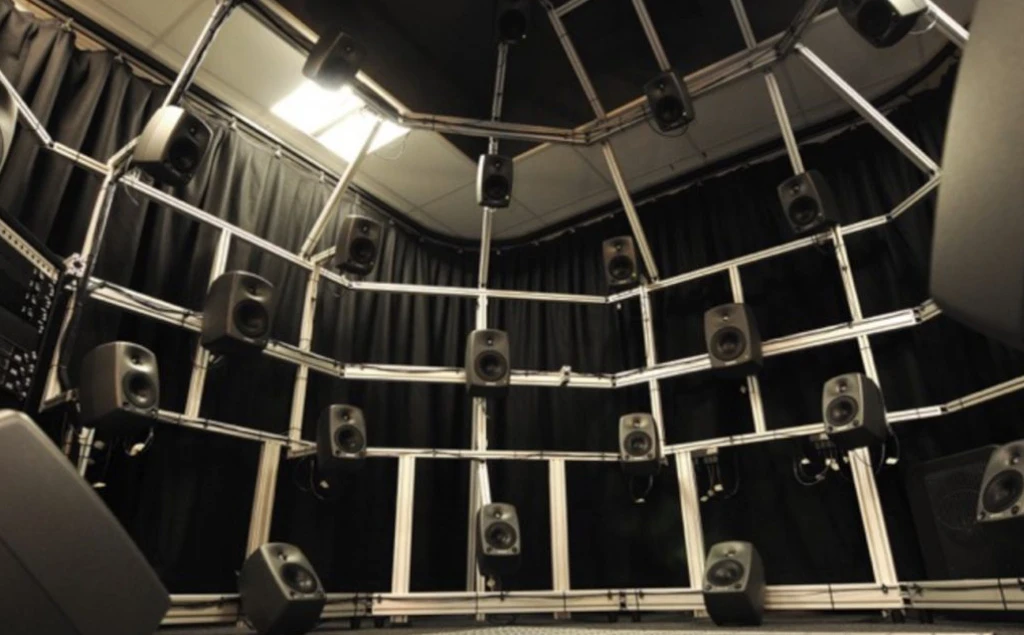Press Publication
On 1 November 2021, Tech Explore published an article featuring our project titled Researchers Develop New Methods to Enhance Film Experience for Visually Impaired. audiences. Find out more.
The Enhancing Audio Description II project seeks to explore the potential of sound design practices and spatial audio to provide accessible film and television experiences for visually impaired audiences. It fuses audio technology and creativity to widen the notion of media accessibility and increase the quality and quantity of provision, providing cutting edge techniques to the UK cultural sector.
Enhancing Audio Description II: implementing accessible, personalised and inclusive film and television
experiences for visually impaired audiences, is a project that proposes a new paradigm in accessible
experiences, in which there is not an overreliance on a narrator's spoken word, as in traditional Audio
Description practices. Instead it utilises new accessibility features that include: the addition of sound
effects, the spatialisation of dialogue and sounding objects, and first-person narration, to provide
accessible experiences that are seamlessly integrated to the soundtrack of a film or television programme.
These techniques are integrated into film and television workflows from the development phase up to final
delivery.
The project builds up from previous research which demonstrated the success of these methods, and explores
them even further, by concentrating on the conveyance of cinematographic elements through sound, the
exploration of the intricacies of using first-person narration across different genres and different cast
sizes, as well as exploring how spatialisation techniques can be adapted for multi-listener scenarios for a
variety of loudspeaker formats. The exploration of these methods will be conducted with an end-user centred
approach, in which visually impaired audiences are consulted from the design process up to delivery.
Furthermore, the project explores the creation of guidelines that will allow the incorporation of these
methods to professional broadcasting pipelines and film workflows, by collaborating with a Project Advisory
Panel representative of the different roles in film and television as well as end users.
Enhancing Audio Description II is funded by the Arts and Humanities Research Council, AH/V015583/1. The
first instance of the project was also possible thanks to the funding provided by the AHRC AH/N003713/1,
AH/N003713/2.
On 1 November 2021, Tech Explore published an article featuring our project titled Researchers Develop New Methods to Enhance Film Experience for Visually Impaired. audiences. Find out more.
On 1 November 2021, Tech Explore published an article featuring our project titled Researchers Develop New Methods to Enhance Film Experience for Visually Impaired. audiences. Find out more.
On 1 November 2021, News Update published an article featuring our project titled Researchers Develop New Methods to Enhance Film Experience for Visually Impaired. audiences. Find out more.
On 25 Oct 2020, Mariana gave a presentation at BBC Sounds Amazing - Celebrating Innovation in Audio. Find out more.
On 28 May 2020, Mariana gave a presentation titled EAD; Integrated Access, Sound Design and Binaural Audio at the Evolving Access Services - Content for All, Television for All online event organised by the DTG Accessibility Group. Find out more.
Back in May, I had the honour to be invited to give a short introductory speech as part of the Associazione Premio Eleanor Worthington International Exhibition on Art and Disability that took place at York St. John University in York (UK). Find out more.
We haven’t published a post since March so we thought it was time we updated you on what we’ve been up to. Find out more.
On 7 Jun 2018, Mariana presented Shelf Life - Incorporating Accessibility to Sound Design at at the Kling Gut symposium, Hamburg. In this presentation she talked about the development of the short film Shelf Life as well as premiered the film. Find out more.
For more information on Shelf Life please visit this page.
Andre Louis is a musician, lover of all-things technology, self-proclaimed geek and loves trying out new gear whenever he can get a hold of it. Find out more.
It’s been a while since we published a blog post, mostly because we’ve been busy giving talks, creating podcasts and writing up the results of the project. On top of that we also made a short film entitled ‘Shelf Life’! Find out more.
On 24 May 2018, Mariana and Gavin presented the concepts, processes, and results linked to the project at the 144th AES Convention in Milan. The title of the presentation was From Seeing to Hearing - Sound Design and Spatialization for Visually Impaired Film Audiences. Find out more.
On 23 Mar 2018, Mariana presented her paper Seeing With Our Ears - Designing Soundtracks For Visually Impaired Audiences at the Seeing Sound. Seeing Sound was an informal practice-led symposium, at University of Bath Spa, exploring multimedia work which foregrounds the relationship between sound and image. It explores areas such as visual music, abstract cinema, experimental animation, audiovisual performance and installation practice through paper sessions, screenings, performances and installations. Find out more.
On 7 Feb 2018, at King's College London, Mariana (then elected chair) gave a public lecture after the annual meeting. The meeting was followed by a social at the Shakespeare’s Head in Holbourn. Find out more.
You can listen to the presentation Olivia and Agnieszka gave at our conference, in our 7th podcast, titled What Makes a Good Subtitle? - Understanding People’s Views on Subtitling Quality. Find out more.
You can listen to the presentation Maria gave at our conference, in our 6th podcast, titled A Brief History of Integrating Description in Theatre by Visually Impaired Artists. Find out more.
You can listen to Kerr's presentation at our conference, in our 5th podcast, titled An Audio Art Form - Accessing the Visual of TV with Audio Description. We uploaded the pod under his previously published interview. Find out more.
Our team carries out focus groups, interviews and other sessions on a regular basis. If you are visually impaired and are interested in participating you can sign up to our participants' mailing list below to find out about the opportunities available.
